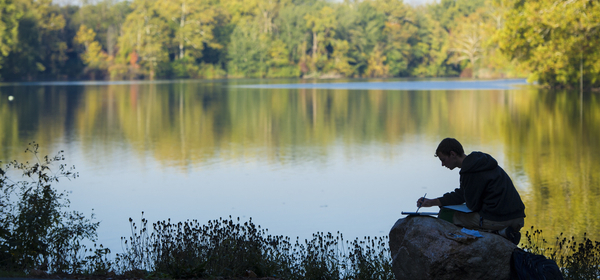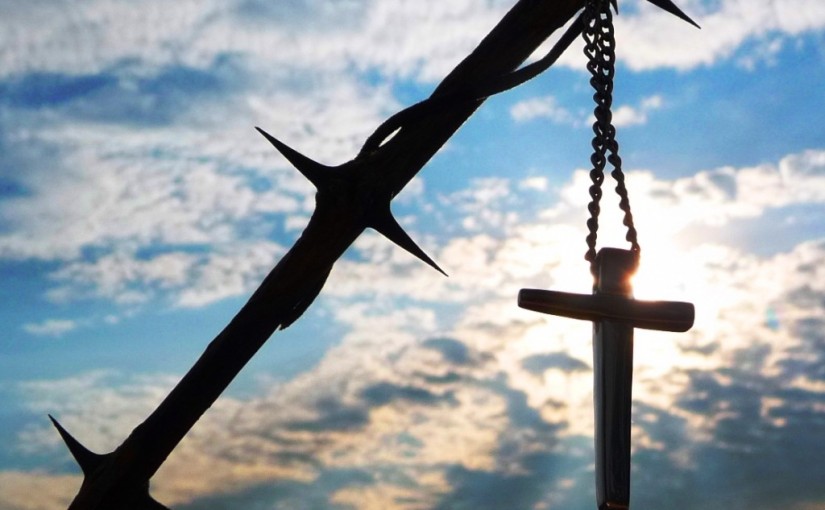Today’s readings
Getting ready for Mass today, I thought about my Dad. Not just because it’s Father’s Day, although that’s certainly part of it. But partly because of today’s Gospel. The story we have here today speaks about a journey, and I’ll say more about that in a minute. My Dad was great for journeys: he loved to drive and take the family to Wisconsin or to Disney, or wherever we needed to go. He’d have us up early in the morning so that we’d miss rush hour traffic, and we’d be on our way.
Today, Jesus and his disciples set out on a significant journey. The reading we have today is at the end of chapter four, in which Jesus has been standing next to the sea, teaching the people by means of parables. He has told them the parable of the sower who went out to sow seeds, the parable of the mustard seed, and the lamp placed on the lamp stand. He is explaining the kingdom of God to them, but they don’t quite get it. Even the disciples have to have it explained to them. When he’s done the best that he can with them, he is ready to move on. There are other people that need to hear the Good News, others who need to know Jesus’ power and authority.
And so he sets out on the journey, and the reading says that the disciples take him with them in the boat “just as he was.” That’s a curious detail, I think. But it makes me remember those trips with my dad. It’s time to get going, no time to change clothes or freshen up, just get in the car – or in this case, the boat – and let’s get started on the journey. But the journey isn’t always without its problems. On vacation trips we may run into traffic, or if in the air, perhaps turbulence. On the sea, the disciples experienced the raging waves of a fearsome storm. So they wake Jesus up, because apparently these storms don’t really affect him, and he rebukes the storm, and then rebukes the disciples for their little faith.
We’re all on a journey. That journey, like that of the disciples, is from fear to faith. We very rarely have time to think about it; we just have to get in the boat and get moving, just as we are. The journey is not always smooth: storms arise, and when they do, it often seems like our God is sleeping, seeming not to care that we are about to perish. I’m not going to fill in the blanks for you – you can all do that well enough. You’ve been on many journeys in your life, and sometimes the ride has been bumpy. But if we stay on the journey, we definitely get to experience this One whom “even wind and sea obey.” Even when our God seems to be sleeping, he is never unaware of our situation, and his love for us is never on pause.
The thing is, sometimes the storm doesn’t seem to stop so quickly as it does in today’s Gospel reading. Would that Jesus would stand up in the boat of our uncertainty and yell out: “Quiet! Be still!” But maybe he is. Maybe the “Be still” is directed at us and not at the storm. There was a contemporary Christian song a few years ago now, that had this wonderful line in it: “Sometimes he calms the storm, and other times he calms his child.” That song has given me peace in many situations. Because as frightening as the storms of our lives can be, they are no match for the grace of God. Even if God allows the storm to rage in our lives, if he is with us, calming us, we have nothing to fear. And maybe that is the occasion when we make progress on that journey from fear to faith.
So as we leave this holy place today, we are on a journey to the most holy place, our true home in heaven. Along the way, we will have other destinations, and as we travel, we know that Jesus will be with us through it all. He may calm the storms that arise, or he may calm his children, whichever is most appropriate. And we know that the journey from fear to faith will lead us back one day to the place we really belong, at the banquet table in the kingdom of everlasting life. May all of our life’s journeys end up in that same, great place!





You must be logged in to post a comment.